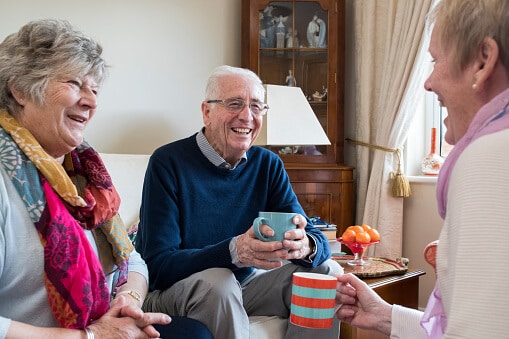
The health benefits of being social for seniors.
Out of necessity, humans evolved into social beings. Our survival depended on cooperating with one another. But beyond survival, we need other people to be happy. And that doesn’t change when it comes to seniors and socialization. The health benefits of being social for seniors are real.
Emotional connectivity is a core part of being human.
Psychology says it’s human nature to be social. People have a powerful, innate need to belong. Older adults especially need a social support system. The National Institute on Aging recognizes a strong correlation between social interaction and the health and well-being of seniors who choose to be social. Seniors who adapt to the changes and challenges of aging often fare better than those who can’t. One thing that can lead to better adaptation is having a support system. This can be family, friends, doctors or clergy. The benefits of social activity in the elderly translate directly to successful aging.
When it comes to seniors and socialization, the benefits include stress reduction, better physical health, and fewer psychological problems such as depression and anxiety. Loneliness can have a physical as well as emotional impact. Seniors who are chronically lonely often have elevated systolic blood pressure. Loneliness is a unique risk factor for depression, which can come to devastate the sense of well-being in older adults. This is why the benefits of social activity for the elderly are so important.
People perform better together.
“Human beings are an ultrasocial species, and our nervous systems expect to have others around us,” says Emiliana Simon-Thomas, Ph.D., science director of the Greater Good Science Center at the University of California, Berkeley, speaking to the NBC News online publication BETTER.
“Physiologically, not having a social support system is actually a source of chronic stress for our bodies,” Simon-Thomas explains. “When people feel lonelier, they have higher levels of the stress hormone cortisol. And that type of chronic stress raises risk of cardiovascular disease and other challenges to health and wellness.”
“Experiments have shown that simply holding someone else’s hand lessens an individual’s emotional response in the brain to a perceived threat,” Simon-Thomas adds.
“Another experiment found that individuals actually perceived a hill to be steeper if they were standing at the bottom alone compared with when they stood at the bottom with a friend. Just having another person there and present, who you trust and feel safe around, makes the world look like a less challenging place,” says Simon-Thomas.
Seniors and socialization: What to choose.
For seniors to fully realize the health benefits of being social, the support must encompass more than physical presence or conversation alone. It should involve activity. Some grandparents, for instance, feel that caring for their grandchildren makes them healthier and more active. They experience a strong emotional bond and often lead a more active lifestyle, eat healthier meals, and may even reduce or stop smoking. Whatever the activity, it should promote positive self-awareness.
Such activities can include reminiscence groups, journal writing, readings of favorite book passages, group exercise, singing groups and many more. Individuals may feel more self-satisfied if they are part of the planning of these social activities — which is more achievable at a senior living community like Hamlet at Chagrin Falls than it is at home.
What are the health benefits of being social?
Research over the years has shown that social relationships affect a range of health outcomes, including mental health, physical health, health habits, and mortality risk.
Improved mental health. We tend to have higher levels of cognitive function with increased social interaction. In a 2007 study, older women who maintained large social networks reduced their risk of dementia or prevented cognitive impairment.
Improved physical health. Another study showed that social networks can help lower blood pressure and control hypertension. This leads to better heart health and blood circulation to the brain.
Greater safety. Simply by being around others, seniors are more likely to live safely. At a community like Hamlet at Chagrin Falls, residents have a care-for-one-another attitude.
Better sense of purpose and belonging. Your social network makes you part of a larger group, and feelings of acceptance, confidence and inclusiveness grow.
Increased growth and learning. Group classes and activities and social interaction contribute to a positive outlook and an enthusiasm for living.
Staying social into one’s senior years is good for the mind, body and spirit. It starts with the decision to become more active and involved, and continues with the right lifestyle choices that open the door to making social connections more easily.
At Hamlet at Chagrin Falls, it’s easy for seniors to be social. Our community offers countless chances to find friends and meaningful fulfillment right outside your door. These friends and neighbors look out for one another and soon come to feel like family. It’s easy to immerse yourself in the serenity and camaraderie of this very personal social network. Take a moment to see what Independent Living is like here at Hamlet.

